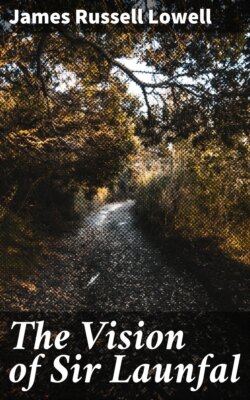Читать книгу The Vision of Sir Launfal - James Russell Lowell - Страница 9
На сайте Литреса книга снята с продажи.
FIRST VENTURE.
ОглавлениеTable of Contents
After his graduation he set about the study of law, and for a short time even was a clerk in a counting-room; but his bent was strongly toward literature. There was at that time no magazine of commanding importance in America, and young men were given to starting magazines with enthusiasm and very little other capital. Such a one was the Boston Miscellany, launched by Nathan Hale, Lowell's college friend, and for this Lowell wrote gaily. It lived a year, and shortly after Lowell himself, with Robert Carter, essayed The Pioneer in 1843. It lived just three months; but in that time printed contributions by Lowell, Hawthorne, Whittier, Story, Poe, and Dr. Parsons—a group which it would be hard to match in any of the little magazines that hop across the world's path to-day. Lowell had already collected, in 1841, the poems which he had written and sometimes contributed to periodicals into a volume entitled A Year's Life; but he retained very little of the contents in later editions of his poems. The book has a special interest, however, from its dedication in veiled phrase to Maria White. He became engaged to this lady in the fall of 1840, and the next twelve years of his life were profoundly affected by her influence. Herself a poet of delicate power, she brought into his life an intelligent sympathy with his work; it was, however, her strong moral enthusiasm, her lofty conception of purity and justice, which kindled his spirit and gave force and direction to a character which was ready to respond, and yet might otherwise have delayed active expression. They were not married until 1844; but they were not far apart in their homes, and during these years Lowell was making those early ventures in literature, and first raids upon political and moral evil, which foretold the direction of his later work, and gave some hint of its abundance.
About the time of his marriage, he published two books which, by their character, show pretty well the divided interest of his life. His bent from the beginning was more decidedly literary than that of any contemporary American poet. That is to say, the history and art of literature divided his interest with the production of literature, and he carried the unusual gift of a rare critical power, joined to hearty spontaneous creation. It may indeed be guessed that the keenness of judgment and incisiveness of wit which characterize his examination of literature sometimes interfered with his poetic power, and made him liable to question his art when he would rather have expressed it unchecked. One of the two books was a volume of poems; the other was a prose work, Conversations on Some of the Old Poets. He did not keep this book alive; but it is interesting as marking the enthusiasm of a young scholar treading a way then almost wholly neglected in America, and intimating a line of thought and study in which he afterward made most noteworthy venture. Another series of poems followed in 1848, and in the same year The Vision of Sir Launfal. Perhaps it was in reaction from the marked sentiment of his poetry that he issued now a jeu d'esprit, A Fable for Critics, in which he hit off, with a rough and ready wit, the characteristics of the writers of the day, not forgetting himself in these lines:
There is Lowell, who's striving Parnassus to climb
With a whole bale of isms tied together with rhyme; He might get on alone, spite of brambles and boulders, But he can't with that bundle he has on his shoulders; The top of the hill he will ne'er come nigh reaching Till he learns the distinction 'twixt singing and preaching; His lyre has some chords that would ring pretty well, But he'd rather by half make a drum of the shell, And rattle away till he's old as Methusalem, At the head of a march to the last new Jerusalem.
This, of course, is but a half serious portrait of himself, and it touches but a single feature; others can say better that Lowell's ardent nature showed itself in the series of satirical poems which made him famous, The Biglow Papers, written in a spirit of indignation and fine scorn, when the Mexican War was causing many Americans to blush with shame at the use of the country by a class for its own ignoble ends. Lowell and his wife, who brought a fervid anti-slavery temper as part of her marriage portion, were both contributors to the Liberty Bell; and Lowell was a frequent contributor to the Anti-Slavery Standard, and was, indeed, for a while a corresponding editor. In June, 1846, there appeared one day in the Boston Courier a letter from Mr. Ezekiel Biglow of Jaalam to the editor, Hon. Joseph T. Buckingham, inclosing a poem of his son, Mr. Hosea Biglow. It was no new thing to seek to arrest the public attention with the vernacular applied to public affairs. Major Jack Downing and Sam Slick had been notable examples, and they had many imitators; but the reader who laughed over the racy narrative of the unlettered Ezekiel, and then took up Hosea's poem and caught the gust of Yankee wrath and humor blown fresh in his face, knew that he was in at the appearance of something new in American literature. The force which Lowell displayed in these satires made his book at once a powerful ally of an anti-slavery sentiment, which heretofore had been ridiculed.
